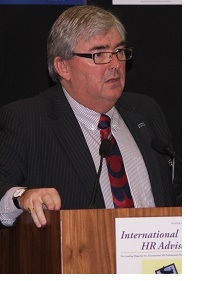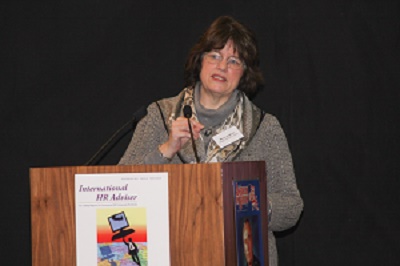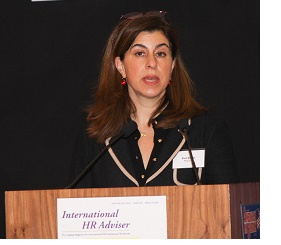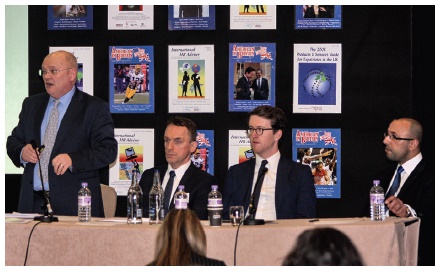2015 Corporate Relocation Conference took place at the Russell Hotel in London on 2 February; as always, organised by Helen Elliott, Editor of International HR Adviser.

While th e exhibitors enjoyed brisk business from the steady flow of visitors, Tad Zurlinden of EuRA expertly managed the business content to introduce a range of speakers who reflected the issues exercising relocation professionals and their assignees.
e exhibitors enjoyed brisk business from the steady flow of visitors, Tad Zurlinden of EuRA expertly managed the business content to introduce a range of speakers who reflected the issues exercising relocation professionals and their assignees.
Understanding and nurturing the Third Country Kid (TCK) Experience.
 Mary Langford, Director of Admissions for Dwight London School said she has been a TCK since the age of two and now works with international schools and families as an educator, researcher, writer, speaker, consultant and trainer. She explained that a significant reason for failure of international assignments revolves around soft issues: the adaptability of families and children. She said that for the majority, when properly understood and managed, the benefits of growing up abroad can far outweigh the challenges. However for some the challenge can be an onerous one and she wanted to help parents and professionals working with internationally-mobile families by sharing research-based insights into how a global experience can enhance future educational and career opportunities for children. She also provided so guidance on how to manage the stumbling blocks encountered along the way helping families approach an overseas assignment with knowledge and optimism to help make it an enriching life-changing experience.
Mary Langford, Director of Admissions for Dwight London School said she has been a TCK since the age of two and now works with international schools and families as an educator, researcher, writer, speaker, consultant and trainer. She explained that a significant reason for failure of international assignments revolves around soft issues: the adaptability of families and children. She said that for the majority, when properly understood and managed, the benefits of growing up abroad can far outweigh the challenges. However for some the challenge can be an onerous one and she wanted to help parents and professionals working with internationally-mobile families by sharing research-based insights into how a global experience can enhance future educational and career opportunities for children. She also provided so guidance on how to manage the stumbling blocks encountered along the way helping families approach an overseas assignment with knowledge and optimism to help make it an enriching life-changing experience.
Mary highlighted the importance of cross cultural training and said that it was even difficult sometimes for people to recognise if they qualified as third country kids. She presented a list of signposts entitled “You know you are a TCK when” which included: ‘Where are you from?’ has more than one reasonable answer; you speak two languages but can’t spell in either; you go into culture shock when returning to your own country; you own personal appliances with three types of plugs.
Did my identity get lost in the move?
 Eva Stock, Director of Sponsor Relations with FOCUS explained that many people feel that they have lost their identity when the move abroad. In particular she said that there are an increasing number of dual career couples going on assignment which often requires one of them to give up their career. “They don’t like to be called a ‘trailing spouse’, nor do they want to say what they used to be,” she explained. “When you move to another country this can create a real sense of loss.”
Eva Stock, Director of Sponsor Relations with FOCUS explained that many people feel that they have lost their identity when the move abroad. In particular she said that there are an increasing number of dual career couples going on assignment which often requires one of them to give up their career. “They don’t like to be called a ‘trailing spouse’, nor do they want to say what they used to be,” she explained. “When you move to another country this can create a real sense of loss.”
Add to this the disorientation people feel when almost everything in their lives that was normal, is no longer normal. They don’t know how to do anything, might not understand the language, and almost certainly will experience cultural changes. Eva’s advice was for assignees to explore career options, maybe take a break or look at the time as an opportunity to try something different. Doing so will help assignees gain confidence, resilience, expanded horizons, enhanced capabilities from facing a challenge, increased cultural awareness and a broader perspective.
Overview of the US/UK tax treaty
 Scott Wickam and Stuart Strong from BDO LLP provided an overview of the US/UK tax treaty and the relevant updates for 2014. This included the obligations related to the requirements of the Affordable Care Act requiring minimum essential coverage for health insurance.
Scott Wickam and Stuart Strong from BDO LLP provided an overview of the US/UK tax treaty and the relevant updates for 2014. This included the obligations related to the requirements of the Affordable Care Act requiring minimum essential coverage for health insurance.
Scott explained that the IRS is still focussed on offshore tax evasion. Stuart explained that the tax treaty is there to help prevent the possibility of expats being double taxed. It was, however, possible for income to be taxed both in the UK and in the US as a result of the timing of the UK tax year. Stuart advised assignees to ensure that both their US and UK tax affairs are handled by the same tax adviser to ensure that they are considered in unison.
Immigration update
Fergusson Snell & Associates presented a detailed explanation of the latest developments in UK immigration and the implications for businesses. The presentation covered immigration policy, global immigration strategy and management, and compliance and risk management.
 The panel from Fergusson Snell explained the current requirements under different types of UK visas and looked at the continuing trends that are affecting the global landscape including: the improving economy that is creating greater movement and technological advancement that is making travel easier.
The panel from Fergusson Snell explained the current requirements under different types of UK visas and looked at the continuing trends that are affecting the global landscape including: the improving economy that is creating greater movement and technological advancement that is making travel easier.
The UK government is continuing efforts to increase the consequences for employers who don’t conform with immigration regulations which include sever penalties and potential criminal sanctions for breaches of immigration rules. Often the penalties are applied to the companies not the individuals. It is, therefore, essential for companies to have the right systems and keep the information and be able to supply it on request. Penalties can include fines or criminal prosecution and can involve business disruption, deportation, reputational damage, impact on an assignee’s family and livelihood.
Other speakers at the conference included: Scott McCormick and Robin Brown from Delloitte Global Employer Services discussing short-term business visitors; Juliet Carp from Speechy Bircham helping to avoid employment disputes; and Total Rewards Group helping to simplify expatriate costs.
Photo: From the top: The Corporate Relocation Conference in full flow; Tad Zurlinden; Mary Langford; Eva Stock, Stuart Strong; Fergusson Snell Associates. Click here to view the next Editor's pick.